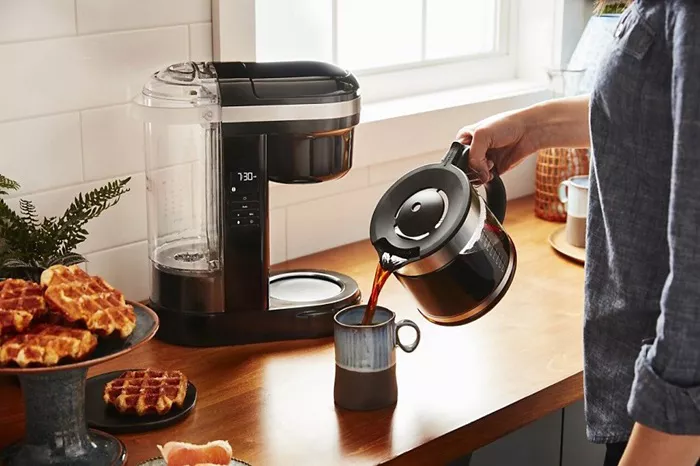Instant coffee has become a popular and convenient choice for coffee lovers worldwide. Whether you’re rushing to get out the door or simply prefer the ease of preparation, it’s hard to beat a quick cup of instant coffee. However, if you’re wondering how much caffeine is in a tablespoon of instant coffee, you’re not alone. The caffeine content can vary, depending on several factors including the brand, type of coffee bean, and how concentrated the coffee is. This article will explore the caffeine content in instant coffee, compare it with other coffee types, and offer advice on how to manage your caffeine intake.
Caffeine Content in Instant Coffee
On average, a tablespoon of instant coffee contains between 30 to 90 milligrams of caffeine. This range exists because various brands and preparation methods influence the concentration of caffeine in the finished product.
Instant coffee is made by freeze-drying or spray-drying brewed coffee, which removes the water content and leaves the coffee in a concentrated powder form. The strength of the coffee can depend on the ratio of water used to dissolve the coffee granules. Therefore, a cup made with a heaping tablespoon may have more caffeine than one made with a scant tablespoon.
Several factors contribute to this variation:
Type of Coffee Beans: Arabica beans, which are typically used in instant coffee, generally contain less caffeine than robusta beans. If the instant coffee is made with robusta beans, it will have a higher caffeine content.
Concentration of Coffee: Some brands offer “strong” instant coffee, which is more concentrated and has a higher caffeine content.
Preparation Method: How much water is added to the coffee granules can affect the caffeine content. More water dilutes the caffeine, while less water will concentrate the caffeine.
Comparison with Other Coffee Types
To give you a clearer idea of how instant coffee stacks up against other types of coffee, let’s compare the average caffeine content of various beverages.
Brewed coffee contains the most caffeine per 8-ounce serving, with a typical cup containing between 95 and 200 milligrams. Espresso, which is more concentrated, has about 63 milligrams of caffeine per ounce. Instant coffee, while convenient, generally offers a lower caffeine dose per serving than brewed coffee and espresso, making it a good option for those looking to moderate their intake. On the other hand, decaf coffee is a suitable choice for individuals who want to enjoy the taste of coffee without the stimulating effects of caffeine.
Health Considerations
Caffeine, a natural stimulant found in coffee, can have both positive and negative health effects. Moderate caffeine consumption has been linked to benefits like improved mental alertness, enhanced athletic performance, and a lower risk of certain diseases such as Parkinson’s disease and type 2 diabetes. However, excessive caffeine intake can lead to side effects like jitteriness, insomnia, and increased heart rate.
Here are some key health guidelines to keep in mind:
Recommended Daily Intake: The U.S. Food and Drug Administration (FDA) suggests that adults consume no more than 400 milligrams of caffeine per day, which is about 4 cups of brewed coffee.
Pregnant Women: Pregnant women should limit their caffeine intake to no more than 200 milligrams per day.
Health Conditions: Individuals with certain conditions, such as heart problems, anxiety disorders, or acid reflux, may need to consume less caffeine. Always consult a healthcare provider if you have concerns about how caffeine might affect your health.
Practical Tips for Managing Caffeine Intake
If you find yourself consuming too much caffeine, there are several practical steps you can take to reduce your intake or avoid potential side effects.
Switch to Decaf: If you’re trying to cut down on caffeine, decaf coffee is a great alternative. It still offers the familiar coffee taste without the jitteriness.
Gradually Reduce Consumption: Rather than quitting coffee cold turkey, try gradually reducing the amount of coffee you drink each day. This can help prevent withdrawal symptoms like headaches.
Use Less Coffee: You can control your caffeine intake by using less coffee when making your brew. Try a half tablespoon of instant coffee or diluting it with more water.
Explore Alternative Beverages: Herbal teas (such as chamomile or peppermint) are naturally caffeine-free and can be a relaxing way to unwind without the stimulating effects of coffee.
Expert Insights
Nutritionists and health experts recommend moderate caffeine consumption to enjoy its benefits without experiencing negative side effects. Dr. Jane Smith, a certified nutritionist, emphasizes, “Caffeine, when consumed responsibly, can boost productivity and improve focus. However, it’s important to understand your limits and listen to your body. If you start feeling anxious or having trouble sleeping, it might be time to cut back.”
Brand selection
For those looking for instant coffee with higher or lower caffeine content, it’s important to choose the right brand. Some brands specifically advertise “high caffeine” instant coffee, which can be a great option for those who need a stronger boost. Alternatively, if you’re sensitive to caffeine, opting for a decaffeinated version might be a better choice.
Finally, there are plenty of caffeine-free beverages to enjoy, such as herbal teas, hot chocolate, or fruit-infused water. These drinks are great alternatives for those who want to avoid caffeine but still enjoy a warm beverage.
Conclusion
Understanding the caffeine content in a tablespoon of instant coffee is essential for making informed choices about your daily caffeine intake. Whether you need a quick pick-me-up or are monitoring your health, knowing how much caffeine is in your cup of coffee helps you enjoy it responsibly. By considering the factors that influence caffeine content, comparing it with other coffee types, and following health guidelines, you can manage your caffeine consumption effectively.
Related topics:
- How Much Caffeine Is in a McCafe K-Cup?
- How Much Caffeine Is Healthy? A Comprehensive Guide
- How Much Caffeine in a Vietnamese Coffee?


